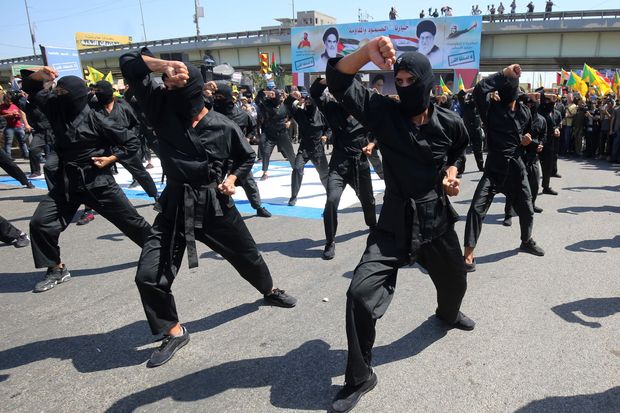
- ARAB NEWS
- 18 Jul 2025

Iran’s power in Iraq is growing, allowing the Iranian regime to increasingly use the Arab state as a proxy battleground in order to achieve its revolutionary ideals and hegemonic ambitions. Most recently, the leaders in Tehran this month violated the sovereignty of the Iraqi government by launching missiles at Iraqi airbases hosting US troops.
One of Iran’s revolutionary principles is to undermine its rivals’ influence in the Middle East through the deployment of its proxies. Iran has mastered this skill of asymmetric warfare not only in Iraq, but also in other countries including Lebanon, Yemen and Syria. For example, Tehran has repeatedly employed the Houthis to attack Saudi Arabia.
In Iraq, the Iran-backed Shiite militia Kata’ib Hezbollah, which is designated a terrorist organization by the US, appears to advance the interests of the Iranian regime. Late last month, it launched four Katyusha rockets, hitting a US base close to Baghdad, the Iraqi capital. And many of the protesters who attacked the US Embassy in Baghdad over the New Year were also reportedly members of the militia.
Kata’ib Hezbollah was founded by Abu Mahdi Al-Muhandis, an Iranian-Iraqi citizen who was a close adviser to Iran’s Quds Force, an elite branch of the Islamic Revolutionary Guard Corps that carries out operations beyond Iran’s borders. The Quds Force and its proxy in Lebanon, Hezbollah, have reportedly been behind the training of Iraqi militia groups such as Kata’ib Hezbollah. The Quds Force has also given birth to several other Iraqi terror groups, such as Asa’ib Ahl Al-Haq and Kata’ib Al-Imam Ali.
The Islamic Republic has used such militia groups to fightin Syria in support of the mullahs’ staunchest ally, Bashar Assad. Tehran has also reportedly utilizedIraqi territory, particularly with the assistance of its militias, to ship arms to Syria.
The Iranian-backed Iraqi militias have been able to survive due to the fact they have a powerful ally that is the top state sponsor of terrorism in the world. After helping found militias in Iraq, the Iranian regime sponsored the Popular Mobilization Forces — a conglomerate of militias, of which Kata’ib Hezbollah is a part. One of the reasons for Iran’s decision to make the Iraqi militias work under one banner was to push the Iraqi government into recognizing all these militias as one legitimate group, incorporating them into state apparatuses and allocating wages and ammunition for them. Through this approach, the Islamic Republic is putting the financial burden on Iraqi taxpayers.
By following in the footsteps of the Iranian regime, Tehran’s Iraqi militias are also skilled at exploiting religion, using sectarianism as a tool to gain power and further Iran’s parochial, religious and political ambitions. The militias are also known for ratcheting up the conflict by engaging in various crimes against civilians, including summary executions, disappearances, torture, indiscriminate attacks and unlawful restrictions on the movement of people fleeing the fighting.
Iranian influence in Baghdad extends beyond the military, as it also includes security and political infiltrations. Iran’s considerable influence over Iraq also derives from social, economic and religious connections between the two states. For example, from an economic perspective, Tehran is reaping significant profits from its exports to Iraq, as nearly 25 percent of all Baghdad’s imports come from Iran.
Iranian influence in Baghdad extends beyond the military, as it also includes security and political infiltrations.
Dr. Majid Rafizadeh
From a religious perspective, the ruling mullahs also send thousands of Iranian religious figures, scholars and students to Iraqi cities like Najaf and Karbala every year, which gives them a considerable amount of influence in shaping public opinion in favor of the Islamic Republic. It goes without saying that several Shiite leaders and political parties in Iraq are known to have been previously based or trained in the Islamic Republic.
Furthermore, Iranian leaders are cognizant of the fact that, as long as they keep Iraq divided and roiled by internal conflicts, and as long as Shiite political parties dominate the Iraqi government, Tehran is likely to remain the most influential foreign force in Iraq. That is why the Iranian regime will make every effort to ensure its militias do not run out of weapons or ammunition. The Islamic Republic has repeatedly smuggled illicit weapons and technology into Iraq.
More broadly, the violence carried out by Iran-backed militias in Iraq ought to give an insight into the tactics and long-term strategies of Iranian-trained and armed proxies across the Middle East, which are built on the regime’s core pillars of destabilization, conflict, assassination, and the rejection of any solution that has Sunni or Western origins.
In conclusion, Iran continues to be the most influential foreign force in Iraq. It acts like an occupying force, exploiting this Arab nation by using it as a proxy battleground to advance its parochial ambitions.
Dr. Majid Rafizadeh is an Iranian-American political scientist. He is a leading expert on Iran and US foreign policy, a businessman and president of the International American Council. Twitter: @Dr_Rafizadeh